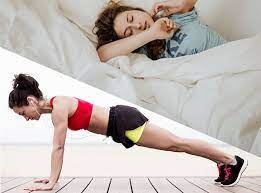Exercise and sleep
 ‘Take regular exercise’ – the advice given in most sleep programs for people suffering from insomnia, and other sleep disorders. However this advice is usually vague, seldom specifying what type of exercise is best, when to do it, for how long, and how often. Also when assessing the impact of exercise on sleep, individual characteristics need to be considered such as age, gender, fitness level, body mass index (BMI) and type of sleeper.
‘Take regular exercise’ – the advice given in most sleep programs for people suffering from insomnia, and other sleep disorders. However this advice is usually vague, seldom specifying what type of exercise is best, when to do it, for how long, and how often. Also when assessing the impact of exercise on sleep, individual characteristics need to be considered such as age, gender, fitness level, body mass index (BMI) and type of sleeper.
The recommended amount of physical activity, to maintain a healthy lifestyle, is 30 minutes of moderate-intensity aerobic exercise (MAE) five times a week. Moderate intensity is where the heart rate and breathing is increased, but one is still able to talk comfortably.
Exercise has been shown to increase the amount of time spent in slow wave sleep (SWS), the deep restorative sleep that helps us feel refreshed, and reduces the amount of rapid eye movement (REM) sleep, where we do most of our dreaming. There has been consistent evidence showing aerobic exercise increases total sleep time and sleep quality.
There are several thoughts as to how exercise may reduce insomnia although the exact mechanism remains to be confirmed. One theory is the increase in body temperature during exercise then triggers a post exercise cooling effect. This drop in body temperature promotes falling asleep, and so is particularly helpful when exercise is taken in the afternoon or later. Another possibility is that exercise reduces levels of stress, anxiety, and depressive symptoms, which are commonly associated with insomnia. Exercise may also influence the circadian rhythms (internal body clock), so that people suffering with insomnia may find a shift in the timing of their body clock, according to the time exercise is performed. This in turn may influence the production and release of melatonin (the sleep producing hormone), shifting the sleep time.
Surprisingly few studies have been devoted to investigating the specific effects of exercise on sleep. The scientific literature tends to have focused on good sleepers who are relatively young (<35years old), rather than those with sleep disorders, in particular the elderly.
However a study undertaken by Passos and colleagues, showed how moderate aerobic exercise (MAE) over a 6 month period in a group of patients with chronic insomnia, significantly improved their sleep. The results showed an increase in sleep duration, reduced time to get to sleep and fewer awakenings after sleep onset. These effects did not vary between morning and late-afternoon exercise. Sleep quality was also assessed in a smaller group of sedentary female patients with chronic insomnia and again showed improved sleep quality, duration efficiency.
Another small sized study looking at a sedentary group of mainly mid 60 year old volunteers with insomnia. They were randomly assigned to either an active group, performing MAE 30 minutes duration 4 times a week, or the inactive (control) group over a 4 month period. At the end of the study the active group reported much better sleep, improved energy and less sleepiness. However looking closer at the results, this improvement was not apparent earlier in the study after 2 months regular exercise, but only experienced after 4 months. Interestingly, the active group reported that their sleep was often no better after a vigorous session of exercise, and sometimes actually worse than on days when less active. Also, if they had a poor night sleep this would curtail the next day’s exercise session. So it seemed that sleep had more of an effect on exercise, rather than the other way around.
In the past the general advice was not to exercise too close to bedtime, due to it being over-arousing which could in turn prevent sleep onset. However more recent studies have shown that evening exercise, did not disrupt sleep, even in poor sleepers. This demonstrated that it is better to engage in exercise than not, even if close to bedtime. Also given that many people work during the day, the evening is the window of time when exercise can be incorporated. So the general advice now is to exercise at any time of the day, as long as it is not encroaching on the time when one would normally be going to sleep. Also what needs to be considered is that some people are more sensitive to the over stimulating effect of exercise compared to others, so to tailor exercise into daily lifestyle accordingly.
So the practical points regarding exercise and its role in promoting sleep:
Regular 30 minute session of moderate intensity aerobic exercise, can help promote sleep and prevent sleep disorders.
Timing of exercise is not as important as previously thought, and evening exercise is better than none at all.
For help:
Take the next step and book your session with DHP. Lazzaro Pisu in Vancouver, today, Call 604 202 7938.
Lazzaro is dedicated to help your mental health. Contact him today.
Therapy From Anywhere. In-Person & Online
